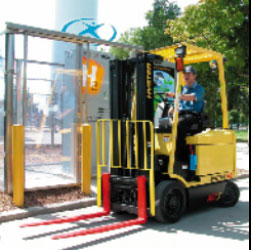With everybody talking about climate change and the price of oil looking set to rise until it finally dries up...
With everybody talking about climate change and the price of oil looking set to rise until it finally dries up, where will fork lift truck users get their power from in the future? Hyster, one of the leading global fork lift truck manufacturers has invested heavily in developing lift trucks that run on the cleaner fuels of tomorrow.
Over a quarter of all fork lift trucks used in Europe and almost half in the US are powered by an internal combustion (IC) engine. Looking ahead, such significant engine use will create problems, not only due to carbon footprint concerns and legislation but also the price of oil.
According to Ian Melhuish from the Hyster global product strategy group, the demand vs. the supply of oil may lead to significantly higher prices of fuel as early as 2013. When this happens, alternative fuels become more attractive to the corporate buyer.
The good news is that fork lift truck manufacturers such as Hyster have invested heavily in finding practical and viable alternatives to IC and battery power and some of them are already available following successful field trials.
Will it be bio fuels, gas or hydrogen fuel cells that keep industry moving?
Bio Fuels Bio-diesel is a diesel equivalent process fuel derived from a wide range of biological sources such as vegetable oils, which can be used in unmodified diesel engines. Some engine manufacturers reported significant advantages such as lower engine wear and a reduction in total carbon emissions; however, others have reported increased wear on components such as seals and fuel pump components, requiring further engine development. In addition, to make this a viable fuel source, a huge investment by the agricultural sector in the volume commercialization of fuel production will be required.
Bio-Ethanol is a “petrol” equivalent of Bio-diesel, offering a reduction in total carbon emissions and decreasing the reliance on petroleum based fuels. However, it does have its drawbacks, for example, it has been known to damage engine components and fuel systems and there are indoor air quality issues.
Hydrogen
Direct gaseous hydrogen injection is an option providing 115% of the power of a petrol engine. Hydrogen can also be added to petrol to increase octane rating and flame velocity allowing ignition timing advances and leaner air-fuel ratio. Both these technologies are however in the early stages of development and not yet viable alternatives.
CNG
Compressed Natural Gas (CNG) is another alternative that is technically easy to implement where CNG is already on site, but it has limited economic viability for general use due to the huge costs involved in maintaining the fuel in liquid form. Furthermore, there is no measurable emissions improvement over modern LPG systems.
Hydrogen fuel Cells
A Hydrogen Fuel Cell converts hydrogen and oxygen into electricity. It works like a battery but does not go ‘dead’ as long as fuel is present and the technology can be deployed with minimal changes to an electric industrial truck.
The Proton Exchange Membrane Fuel Cell system favoured is very simple, operating at 80°C, converting at 80% efficiency, making it more efficient than both diesel and battery power. There are no moving parts, the technology is 99.99% reliable and is 98% recycleable.
Benefits include a smaller carbon footprint, improved fuel efficiency and fewer refueling stops which can contribute to a reduction in fleet size of 1 truck in 20. Currently, the economic viability of fuel cells is still limited, but improving, due to the high initial capital costs involved, mainly because of a lack of hydrogen fuel infrastructure and production costs of the truck itself.
Compared to battery technology, there are also numerous cost advantages:- less space required, no battery charging personnel required, chargers, hoists and battery maintenance equipment is not required. Hyster has this technology ready for the market and has already completed rigorous successful field trials.
Hydrogen Fuel cells – Results of Hyster tests at General Motors
The North American car manufacturer General Motors (GM) tested two converted Hyster J2.50 trucks with fuel cells for three months, 19 hours per day. During this time the trucks were fuelled 137 times, which takes 10 minutes each time. The consumption per truck was 2,8 kg of Hydrogen per 24 hour period. GM gained a 5% increase in productivity compared with a conventional electric truck with battery change times of 80 minutes day.
No-one really knows which technology will prevail, however it is clear that the IC engine market for fork lift trucks will change in the future due to oil price and environmental pressures.
That is why manufacturers such as Hyster are investing heavily to ensure that the power of tomorrow is commercially available in the near future.
Hyster Europe








 粤公网安备 44010602003952号
粤公网安备 44010602003952号